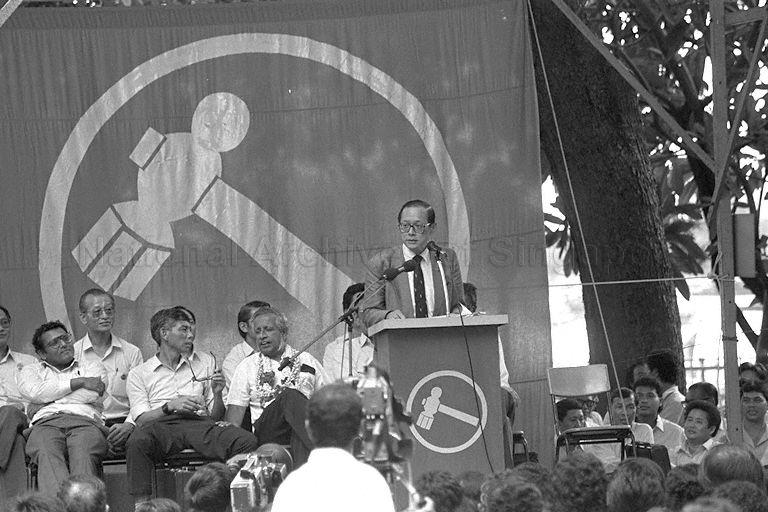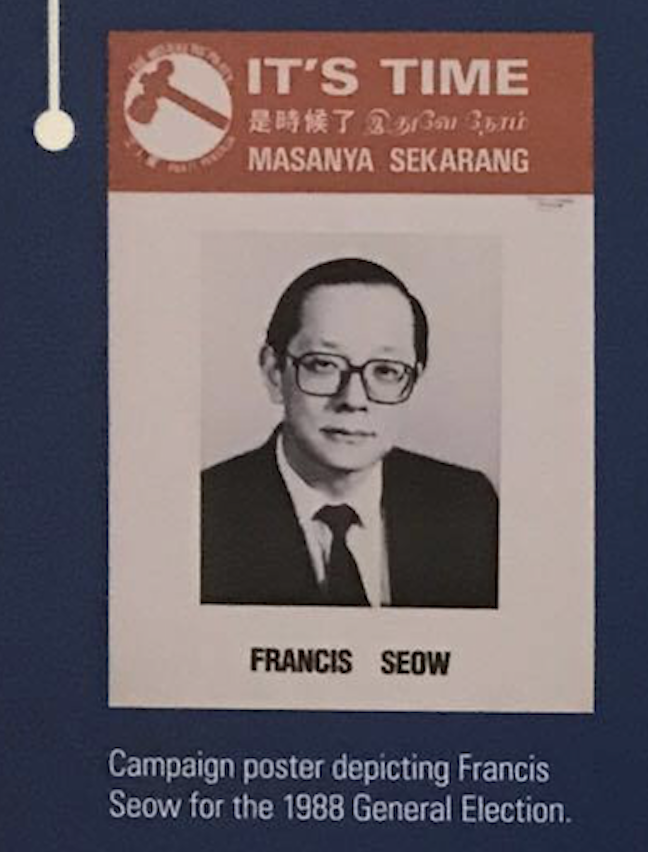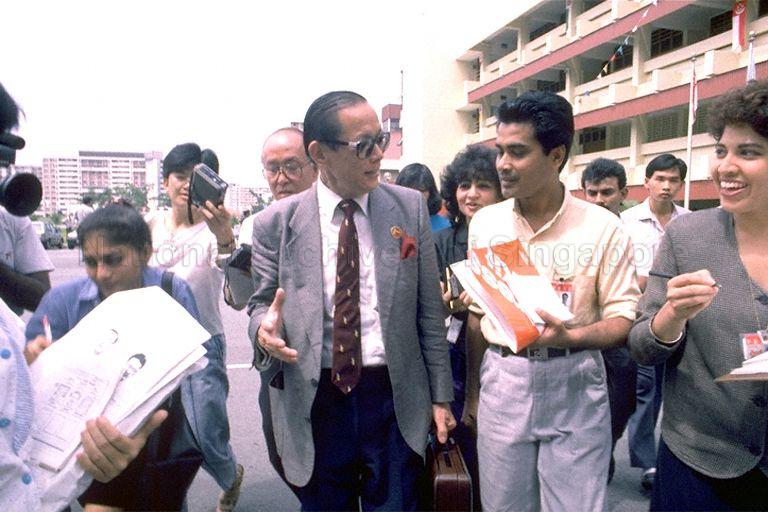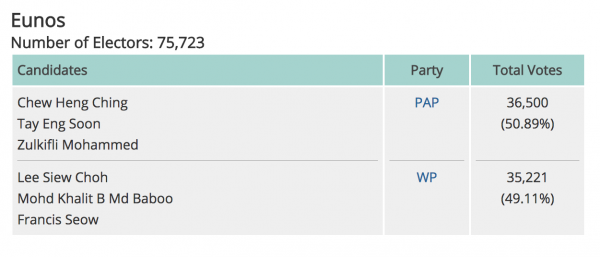2017 is a significant year not only because of the non-existent reserved election for a Malay Elected President, it also happens to be the 60th anniversary of the founding of Singapore's main opposition party -- the Workers' Party (WP).
In its long history, the WP has counted a number of prominent figures among its ranks, contesting in elections against the dominant PAP. One of them was former Solicitor-General and Law Society President Francis Seow, who was a WP star candidate in the 1988 General Election.
1988 was a milestone year. Not only was there a GE, it would be the first GE featuring the Group Representation Constituency (GRC) system. It was implemented to ensure minority race representation in Parliament, but it also undoubtedly made it harder for opposition MPs to win seats.
Seow had joined the WP just before the GE was scheduled to take place in September 1988, and he would wage the Battle for Eunos.
 Photo from the National Archives of Singapore.
Photo from the National Archives of Singapore.
The rise of Francis Seow
Seow was born in 1928. He attended St. Joseph's Institution and was a member of the Middle Temple in London. He joined the Singapore Legal Service in 1956, and made a name for himself as a brilliant prosecutor.
He was involved in many high profile cases, involving corrupt union bosses, prison rioters and murderers. He also represented the State in the case against two Indonesian saboteurs for the 1965 bombing of MacDonald House which killed three people and injured 33. The duo were convicted of murder and hanged.
Seow was made Solicitor-General, the second-highest rank in the Attorney-General's Chambers in 1969. In 1972, he resigned and went into private legal practice. He was awarded the Public Administration (Gold) Medal in the same year for his service.
[related_story]
President of the Law Society
Although Seow was on friendly terms with founding Prime Minister Lee Kuan Yew, storm clouds gathered when he found out that Seow was thinking of joining David Marshall's law firm.
Marshall, the first Chief Minister of Singapore, was the founder of the WP. Although he was no longer the party's driving force then, he was still a vocal critic of the PAP. Seow claimed in his book To Catch a Tartar: A Dissident in Lee Kuan Yew's Prison that LKY asked him not to join Marshall.
He did not, but Seow did join the Law Society in 1976. In 1986, he was elected its President. He envisioned a new role for the society, where it would take on a more active role in commenting on legislation passed by Parliament.
To nobody's surprise, LKY disagreed with this approach. According to his book Third World to First:
"With Seow as president, the Law Society became politicised, criticising and attacking government legislation not on professional but on political grounds, something it had never done as a professional organisation constituted by law to maintain discipline and standards in the legal profession."
In 1986, Seow criticised a proposed Amendment to the Newspaper and Printing Presses Act that would allow the government to restrict foreign publications found to be interfering in domestic politics.
Later that same year, the government amended the Legal Profession Act to "tighten up" how the Law Society regulated the legal profession. It restricted the society's role so it could only "assist the Government in all matters affecting legislation submitted to it". This meant that it could only comment on legislation if the government asked for it.
Detained under the ISA for foreign collusion
1988 would be a busy year for Seow. A year earlier in May 1987, the government launched Operation Spectrum against a "Marxist conspiracy". 22 people were arrested and detained without trial. Seow agreed to defend two of the detainees as legal counsel.
In May 1988, Seow himself was arrested under the ISA while he was waiting at ISD headquarters to meet his clients. The government accused him of colluding with foreign powers to lead a team of lawyers to contest in the general election.
Seow admitted the same in a sworn affidavit. The government published this affidavit, and released Seow after 72 days in detention. This was two months before the GE.
Seow would later allege that he had been ill-treated while detained, but for now the elections were looming. He joined the WP, and was assigned to win the battleground GRC of Eunos.
 Photo by Sulaiman Daud.
Photo by Sulaiman Daud.
The 1988 General Election
The first ever election under the GRC system saw the PAP fielding a team of Tay Eng Soon, Chew Heng Ching, and Zulkifli Mohammed.
Zulkifli had previously contested Eunos when it was an SMC in the 1984 GE, winning with 64.81% of the vote. Tay was a popular MP, then serving as the Minister of State of Education. He had been a walkover winner in River Valley for the 1984 GE, but was switched to Eunos to counter the opposition's star power.
And star power they had. Seow would join two other WP members, Lee Siew Choh and Mohd Khalit bin Mohd Baboo into the fray. Lee was actually a former member of the PAP, even serving as the Parliamentary Secretary for Home Affairs in 1960. But he broke away in 1961 to form the Barisan Socialis.
Once Singapore's main opposition party, Bariasan had merged with the WP by 1988. Lee and Seow's prominence on the same team showed how keen the WP were to win Eunos.
According to the book A History of Modern Singapore, "the most spirited opposition campaigning in 20 years generated enormous public excitement in Eunos."
 Photo from National Archives of Singapore.
Photo from National Archives of Singapore.
For Eunos residents who can remember GE 1988, it must have been an exciting time. After all the hue and cry, the WP would lose by less than a percentage point. His three-man team lost to the People's Action Party but secured 49.11 per cent of valid votes.
The Aftermath
 Screen shot from the ELD.
Screen shot from the ELD.
Under the new system, and because they were the best-performing team that lost, two Non-Constituency MP (NCMP) seats were offered to Seow and Lee. Seow never took up his NCMP seat. While awaiting trial for alleged tax evasion, Seow sought medical treatment in the US and did not return, disregarding court requests to come back and stand trial. He was convicted in absentia.
Seow settled in the US and even became a visiting fellow at both Yale University and Harvard Law School. He died in Boston, Massachusets on 21 January 2016, aged 88 years old.
Eunos would remain a GRC for only one more election in 1991. In the 1997 GE, it was divided among three other GRCs, including Aljunied GRC.
Although Seow failed in 1988, some part of Eunos would eventually become WP territory in 2011 when they won Aljunied GRC.
Related stories:
Low Thia Khiang will be the longest-serving opposition MP in Singapore’s history by end of 2017
WP’s Tang Liang Hong, who got sued until his pants dropped, waged the Battle for Cheng San
Workers’ Party’s new HQ on outskirts of Geylang is a modest reflection of where they are now
Top image from YouTube.
If you like what you read, follow us on Facebook, Instagram, Twitter and Telegram to get the latest updates.
